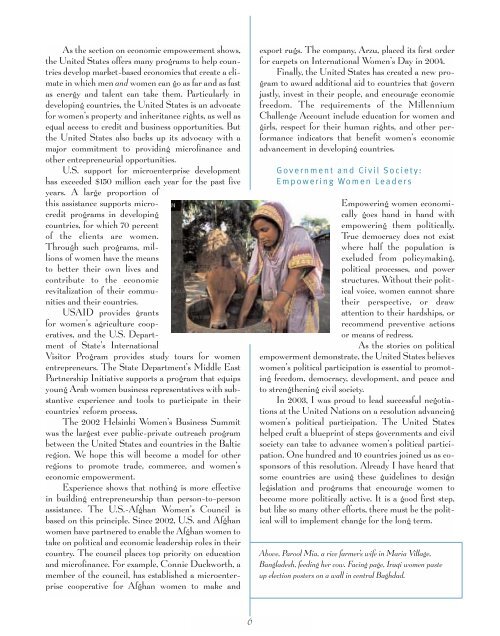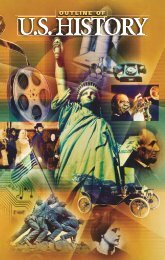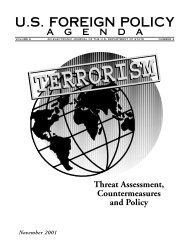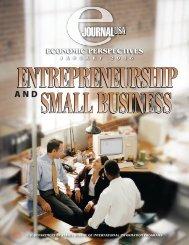Working for Women Worldwide - Embassy of the United States
Working for Women Worldwide - Embassy of the United States
Working for Women Worldwide - Embassy of the United States
Create successful ePaper yourself
Turn your PDF publications into a flip-book with our unique Google optimized e-Paper software.
As <strong>the</strong> section on economic empowerment shows,<br />
<strong>the</strong> <strong>United</strong> <strong>States</strong> <strong>of</strong>fers many programs to help countries<br />
develop market-based economies that create a climate<br />
in which men and women can go as far and as fast<br />
as energy and talent can take <strong>the</strong>m. Particularly in<br />
developing countries, <strong>the</strong> <strong>United</strong> <strong>States</strong> is an advocate<br />
<strong>for</strong> women’s property and inheritance rights, as well as<br />
equal access to credit and business opportunities. But<br />
<strong>the</strong> <strong>United</strong> <strong>States</strong> also backs up its advocacy with a<br />
major commitment to providing micr<strong>of</strong>inance and<br />
o<strong>the</strong>r entrepreneurial opportunities.<br />
U.S. support <strong>for</strong> microenterprise development<br />
has exceeded $150 million each year <strong>for</strong> <strong>the</strong> past five<br />
years. A large proportion <strong>of</strong><br />
this assistance supports microcredit<br />
programs in developing<br />
countries, <strong>for</strong> which 70 percent<br />
<strong>of</strong> <strong>the</strong> clients are women.<br />
Through such programs, millions<br />
<strong>of</strong> women have <strong>the</strong> means<br />
to better <strong>the</strong>ir own lives and<br />
contribute to <strong>the</strong> economic<br />
revitalization <strong>of</strong> <strong>the</strong>ir communities<br />
and <strong>the</strong>ir countries.<br />
USAID provides grants<br />
<strong>for</strong> women’s agriculture cooperatives,<br />
and <strong>the</strong> U.S. Department<br />
<strong>of</strong> State’s International<br />
Visitor Program provides study tours <strong>for</strong> women<br />
entrepreneurs. The State Department’s Middle East<br />
Partnership Initiative supports a program that equips<br />
young Arab women business representatives with substantive<br />
experience and tools to participate in <strong>the</strong>ir<br />
countries’ re<strong>for</strong>m process.<br />
The 2002 Helsinki <strong>Women</strong>’s Business Summit<br />
was <strong>the</strong> largest ever public-private outreach program<br />
between <strong>the</strong> <strong>United</strong> <strong>States</strong> and countries in <strong>the</strong> Baltic<br />
region. We hope this will become a model <strong>for</strong> o<strong>the</strong>r<br />
regions to promote trade, commerce, and women’s<br />
economic empowerment.<br />
Experience shows that nothing is more effective<br />
in building entrepreneurship than person-to-person<br />
assistance. The U.S.-Afghan <strong>Women</strong>’s Council is<br />
based on this principle. Since 2002, U.S. and Afghan<br />
women have partnered to enable <strong>the</strong> Afghan women to<br />
take on political and economic leadership roles in <strong>the</strong>ir<br />
country. The council places top priority on education<br />
and micr<strong>of</strong>inance. For example, Connie Duckworth, a<br />
member <strong>of</strong> <strong>the</strong> council, has established a microenterprise<br />
cooperative <strong>for</strong> Afghan women to make and<br />
export rugs. The company, Arzu, placed its first order<br />
<strong>for</strong> carpets on International <strong>Women</strong>’s Day in 2004.<br />
Finally, <strong>the</strong> <strong>United</strong> <strong>States</strong> has created a new program<br />
to award additional aid to countries that govern<br />
justly, invest in <strong>the</strong>ir people, and encourage economic<br />
freedom. The requirements <strong>of</strong> <strong>the</strong> Millennium<br />
Challenge Account include education <strong>for</strong> women and<br />
girls, respect <strong>for</strong> <strong>the</strong>ir human rights, and o<strong>the</strong>r per<strong>for</strong>mance<br />
indicators that benefit women’s economic<br />
advancement in developing countries.<br />
Government and Civil Society:<br />
Empowering <strong>Women</strong> Leaders<br />
Empowering women economically<br />
goes hand in hand with<br />
empowering <strong>the</strong>m politically.<br />
True democracy does not exist<br />
where half <strong>the</strong> population is<br />
excluded from policymaking,<br />
political processes, and power<br />
structures. Without <strong>the</strong>ir political<br />
voice, women cannot share<br />
<strong>the</strong>ir perspective, or draw<br />
attention to <strong>the</strong>ir hardships, or<br />
recommend preventive actions<br />
or means <strong>of</strong> redress.<br />
As <strong>the</strong> stories on political<br />
empowerment demonstrate, <strong>the</strong> <strong>United</strong> <strong>States</strong> believes<br />
women’s political participation is essential to promoting<br />
freedom, democracy, development, and peace and<br />
to streng<strong>the</strong>ning civil society.<br />
In 2003, I was proud to lead successful negotiations<br />
at <strong>the</strong> <strong>United</strong> Nations on a resolution advancing<br />
women’s political participation. The <strong>United</strong> <strong>States</strong><br />
helped craft a blueprint <strong>of</strong> steps governments and civil<br />
society can take to advance women’s political participation.<br />
One hundred and 10 countries joined us as cosponsors<br />
<strong>of</strong> this resolution. Already I have heard that<br />
some countries are using <strong>the</strong>se guidelines to design<br />
legislation and programs that encourage women to<br />
become more politically active. It is a good first step,<br />
but like so many o<strong>the</strong>r ef<strong>for</strong>ts, <strong>the</strong>re must be <strong>the</strong> political<br />
will to implement change <strong>for</strong> <strong>the</strong> long term.<br />
Above, Parool Mia, a rice farmer’s wife in Maria Village,<br />
Bangladesh, feeding her cow. Facing page, Iraqi women paste<br />
up election posters on a wall in central Baghdad.<br />
6












